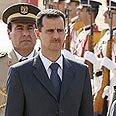
Poker player
צילום: רויטרס
Assad back in game
Like seasoned poker player, Syrian president keeps his cards close to his chest
At the last moment, following “clarifications” from Washington regarding the Golan, Syria decided to also get on the bandwagon and attend the Annapolis conference. All of this was expected. However, below the surface, while Israeli officials are busy with the peace conference and rank of representatives sent to attend it, there are other events going on in the Middle East that shed a different light on the conference.
The bottom line is that we are seeing another phase in the mighty struggle between the United States and Iran over influence in our region, with the arenas of the clash merely changing: In Annapolis, for example, the Bush Administration is attempting to display its power by convening Israel and the Palestinians with the support of the Arab League, including Saudi Arabia, Syria, and Lebanon. Meanwhile, the Teheran-Damascus axis proves its strength in other arenas: The destabilized Lebanon, the burning Iraq, and unstable Gaza Strip.
Time and again, Iran proves the strength of its grip in the “Shiite crescent,” from Iraq to Syria and Lebanon, all the way to the Palestinian territories. Syria fully admits to it. Its foreign minister traveled to Teheran to coordinate positions. A Syrian parliament member spoke about “strategic ties” that create a “crescent of resistance against the US and the Zionists.” If this is not an admission of the establishment of an anti-American bloc in the Mideast, what is?
The dangerous game taking place in Lebanon these days also has a significant and almost direct influence on Israel. Ever since the last war, Lebanon is facing political paralysis between two main camps: The anti-Syria bloc, supported by the West, and the opposition, headed by Hizbullah with the support of Iran and Syria. At this time the crisis touches upon a dramatic question: The identity of the next Lebanese president. The players have remained the same.
Pilgrimage to Damascus
It was therefore amazing to see representatives of Europe and Russia make pilgrimages to Damascus one after another last week in order to ask Assad for assistance on the Lebanese front. Even the Jordanian king ended a lengthy rift and came for a historic visit bearing a tempting package: Help us on the Lebanese front, come to Annapolis, and get an immediate improvement of relations with Jordan, Egypt, and Saudi Arabia, which all turned their backs on Syria in the last war and after it.French President Sarkozy also acceded and called after he realized, along with the Americans, that there is no choice: In order to make Annapolis a success and prevent chaos in Lebanon, Assad must be enlisted.
With its breached Iraqi border, support for Palestinian terror groups, and in Lebanon as well, Damascus proves again that its hand (along with Iran’s hand) is firmly on the faucet. If it wants to, it will put out the fire. Otherwise, it can make the order in Beirut go up in flames. And this is exactly what Syria wanted over the weekend: Prove to George Bush and to the entire world that it’s coming to Annapolis on its own terms. Not out of weakness.
“There is no doubt that Syria still has great control in Lebanon,” Lebanese sources told Ynet. “Syria is playing the double game, in accordance with its interests. It lost the Golan Heights, and later it lost Lebanon, and now it attempts, through the Lebanese card, to get back in the game.”
Just like a seasoned poker player, Assad, who recently was humiliated by the Israeli Air Force’s attack in its territory, is keeping his cards close to his chest.
And so, Syria continues with its double game: It accepts Washington’s invitation, but clings to the alliance with Iran; attends Annapolis, but sends a lower-ranked representative than other Arab states; doesn’t believe Israel, but seeks a similar conference with the Jewish state, maybe in Moscow; continues to support terror groups, but cancels a special convention they organized, to the point of reports of a rift between Damascus and Hamas’ leadership.
What will this dangerous game lead to? More of the same: Talk of peace on the one hand, with power games in Lebanon and the other arenas on the other end. In Lebanon, political tensions will persist, with Hizbullah already showing its displeasure over the transfer of authority from the outgoing president to the government.
The bottom line: No peace conference will change the Syrian and Iranian influence in Beirut, and also in Jerusalem, in the near future.










